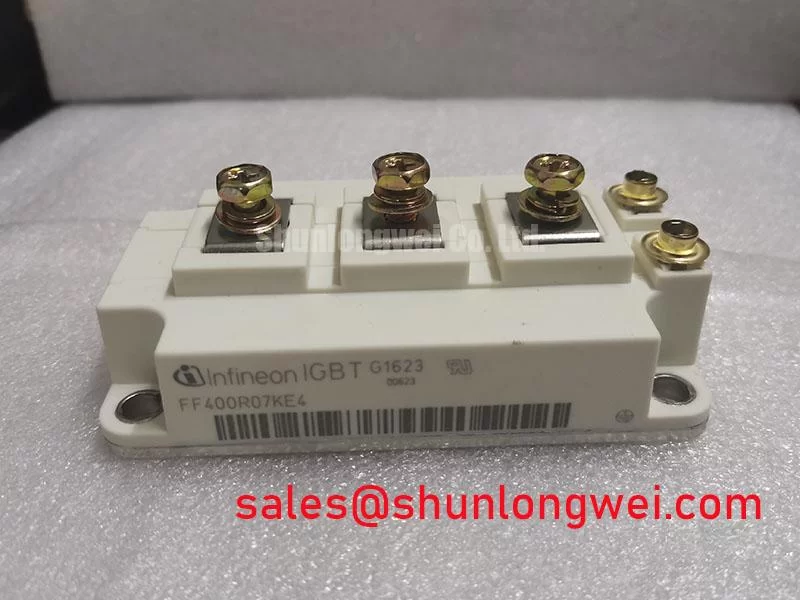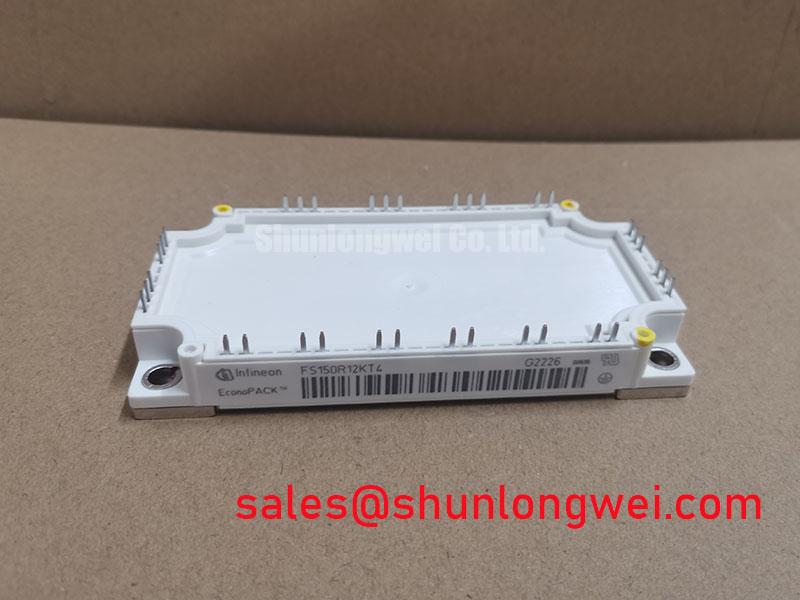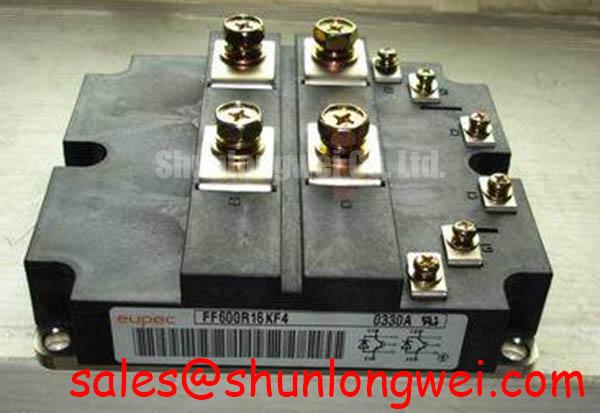Content last revised on January 26, 2026
FS800R07A2E3: High-Current IGBT Module for Demanding Automotive Powertrain Applications
An In-Depth Engineering Review
Engineered for the rigorous demands of electric and hybrid vehicle (xEV) powertrain systems, the Infineon FS800R07A2E3 is a high-power IGBT module designed for exceptional thermal performance and electrical efficiency in high-stress inverter applications. This module delivers a robust 650V | 800A capability, featuring very low collector-emitter saturation voltage (VCE(sat)) and optimized switching losses. Its design prioritizes maximizing power density and ensuring long-term operational reliability. What is the key to its thermal performance? A Pin-Fin baseplate designed for direct liquid cooling, which significantly enhances heat dissipation compared to flat baseplate designs. For engineers developing inverters for commercial, construction, and agricultural vehicles (CAV), this module provides the high current density required to achieve compact and efficient system designs.
Key Parameter Overview
Decoding the Specs for Enhanced Thermal Reliability
The technical specifications of the FS800R07A2E3 underscore its suitability for high-power, thermally demanding applications. The combination of high current capacity and advanced thermal interface technology provides a solid foundation for robust and efficient inverter design.
| Parameter | Value | Engineering Significance |
|---|---|---|
| Collector-Emitter Voltage (Vces) | 650 V | Provides a sufficient voltage margin for battery systems up to 450V, ensuring safe operation during voltage transients. |
| Continuous Collector Current (Ic) @ 100°C | 800 A | Highlights the module's capacity to handle substantial continuous currents, critical for high-torque motor drive applications. |
| Collector-Emitter Saturation Voltage (VCE(sat)) @ 800A, 150°C | 1.90 V (Typ.) | A low VCE(sat) directly translates to lower conduction losses, which reduces heat generation and improves overall inverter efficiency. |
| Total Switching Energy (Ets) @ 400A, 150°C | 110 mJ (Typ.) | Indicates low energy loss during on/off transitions, a key factor for efficiency in systems operating at higher PWM frequencies. |
| Thermal Resistance, Junction-to-Heatsink (RthJH) per IGBT | 0.075 K/W | This exceptionally low thermal resistance, facilitated by the Pin-Fin baseplate, ensures highly efficient heat transfer to the liquid cooling system, maximizing reliability. |
Download the FS800R07A2E3 datasheet for detailed specifications and performance curves.
Application Scenarios & Value
System-Level Benefits in High-Power Electric Vehicle Inverters
The FS800R07A2E3 is specifically tailored for main inverters in hybrid and electric vehicles, particularly in the commercial and agricultural sectors where power demands and operational uptime are critical. Its robust 800 A current rating makes it a prime candidate for motor drives that require high torque for applications like electric buses, tractors, and construction equipment.
A key engineering challenge in these systems is managing the immense heat generated by the power electronics within a confined space. The module's design directly confronts this issue. The Pin-Fin baseplate acts like a built-in radiator, creating a large surface area for direct and efficient liquid cooling. This is analogous to how a high-performance car's engine uses a specialized radiator to maintain optimal temperature under extreme load. For the design engineer, this superior thermal management means a smaller, less complex cooling system can be employed, reducing overall inverter size, weight, and bill of materials. The result is a more power-dense and reliable powertrain, capable of sustained high-output operation. For systems with different power requirements, the related FS450R17KE3 offers solutions for higher voltage applications, while the FS400R07A1E3 provides an option for lower current needs within the same technology family.
Frequently Asked Questions (FAQ)
How does the Pin-Fin baseplate on the FS800R07A2E3 improve inverter reliability?
The Pin-Fin structure creates a significantly larger surface area for heat exchange with a liquid coolant compared to a traditional flat baseplate. This results in a very low thermal resistance (RthJH), allowing heat to be extracted from the IGBT chips much more efficiently. This superior cooling minimizes peak operating temperatures and reduces thermo-mechanical stress during power cycling, directly enhancing the long-term reliability and operational lifetime of the inverter.
What is the significance of the 650V blocking voltage for EV applications?
While many automotive systems operate around a 400V bus, the 650V rating provides a crucial safety and reliability margin. It ensures the device can safely withstand voltage overshoots and transient spikes that occur during high-speed switching events and regenerative braking, preventing catastrophic failure and ensuring robust performance across all operating conditions.
What does the Trench/Fieldstop IGBT3 technology used in this module mean for performance?
This Infineon TRENCHSTOP™ IGBT3 technology is engineered to provide an optimal balance between conduction losses (low VCE(sat)) and switching losses (low Ets). For a motor drive application, this means less energy is wasted as heat both when the motor is running at a steady speed (conduction) and when its speed is changing rapidly (switching). This dual efficiency leads to improved overall system performance and can extend vehicle range.
Technical Deep Dive
A Closer Look at Thermal Management and Reliability
The operational reliability of a high-power IGBT module is inextricably linked to its thermal design. The FS800R07A2E3's architecture is a testament to this principle. The core of its thermal advantage lies in the direct liquid-cooled Pin-Fin copper baseplate. Think of it as the difference between air-cooling and liquid-cooling a computer processor; liquid cooling is vastly more effective at removing concentrated heat. The specified RthJH of 0.075 K/W per IGBT is a critical metric that quantifies this effectiveness. It signifies that for every watt of heat generated, the IGBT junction temperature will only rise by 0.075°C above the heatsink temperature. This low value allows designers to push for higher power density or to build in greater thermal margin for extreme ambient conditions, a key consideration for vehicles operating globally. Furthermore, the module utilizes a high-performance ceramic substrate and an enhanced wire-bonding process, which together improve its resilience against the mechanical stress of thermal cycling, a primary failure mechanism in automotive power modules.
Strategic Considerations for Powertrain Development
Integrating the FS800R07A2E3 into a powertrain design provides a strategic advantage for developers targeting the commercial and industrial EV markets. The module's high current density and superior thermal efficiency enable the creation of more compact, lighter, and ultimately more cost-effective inverter systems. This aligns directly with industry pressures to reduce vehicle weight to maximize range and payload capacity. By leveraging a pre-qualified, automotive-grade module from a reputable manufacturer like Infineon, engineering teams can de-risk their development process and accelerate time-to-market. The robust thermal and power cycling capabilities ensure the final product meets the stringent reliability and lifetime expectations of the automotive industry, building brand reputation and ensuring customer satisfaction in the field.
















